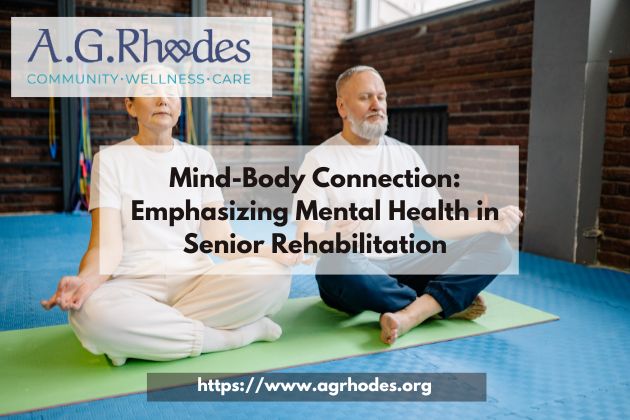
This blog post explores the mind-body connection in senior rehabilitation. We’ll delve into the impact of mental health on physical recovery, explore the various ways mental health can be integrated into rehabilitation programs, and discuss the benefits of a holistic approach.
The Intertwined Threads: Mind and Body in Aging
As we age, we face a multitude of physical changes. These changes can be accompanied by a range of mental health challenges, including:
- Depression: The loss of independence, social connections, and physical abilities can contribute to feelings of sadness, hopelessness, and worthlessness.
- Anxiety: Uncertainties about the future, health concerns, and financial worries can trigger anxiety symptoms like worry, restlessness, and difficulty sleeping.
- Social Isolation: Reduced mobility and declining health can lead to social isolation, further exacerbating feelings of loneliness and depression.
- Cognitive Decline: While not inevitable, some seniors experience age-related cognitive decline, which can lead to frustration and fear.
The Downward Spiral: How Mental Health Impacts Recovery
Neglecting mental health can significantly hinder the effectiveness of physical rehabilitation. Here’s how:
- Reduced Motivation: Depression and anxiety can zap a person’s motivation to participate in therapy sessions and adhere to rehabilitation plans.
- Increased Pain Perception: Stress and anxiety can heighten pain perception, making it more difficult to tolerate necessary physical therapy exercises.
- Sleep Disturbances: Mental health issues can disrupt sleep patterns, which are crucial for healing and recovery.
- Weakened Immune System: Chronic stress can weaken the immune system, making it harder for the body to fight infection and heal from injuries.
A Holistic Approach: Integrating Mental Health into Rehabilitation
The good news is that by integrating mental health support into senior rehabilitation programs, we can create a more comprehensive and effective approach to healing. Here are some ways to achieve this:
- Mental Health Assessments: Regular screenings for depression, anxiety, and other mental health concerns should be part of the initial assessment process.
- Individualized Therapy: Offering access to individual therapy sessions with psychologists or social workers can help seniors address specific mental health challenges and develop coping mechanisms.
- Support Groups: Connecting seniors with support groups allows them to share experiences, find camaraderie, and reduce feelings of isolation.
- Mind-Body Practices: Techniques like mindfulness meditation, yoga, and tai chi can promote relaxation, stress reduction, and improved emotional well-being.
- Positive Psychology Interventions: These interventions can help seniors develop a more optimistic outlook, foster resilience, and enhance self-efficacy, all of which contribute to a positive rehabilitation experience.
Benefits of a Mind-Body Approach
Integrating mental health support into senior rehabilitation programs leads to a multitude of benefits, including:
- Improved Physical Outcomes: When mental well-being is addressed, seniors are more likely to be motivated, engaged, and adherent to therapy plans, leading to better physical recovery.
- Reduced Pain Perception: Stress management techniques can help lessen the feeling of pain, improving quality of life and facilitating participation in physical therapy.
- Enhanced Sleep Quality: By addressing anxiety and depression, seniors can experience improved sleep patterns, supporting overall health and healing.
- Increased Motivation and Resilience: Therapy can equip seniors with coping mechanisms and a more positive outlook, fostering a sense of empowerment and control over their well-being.
- Improved Quality of Life: By addressing both physical and mental aspects of health, senior rehabilitation programs can significantly enhance quality of life as seniors age.
Conclusion
The mind-body connection is undeniable. Senior rehabilitation programs that prioritize mental health alongside physical therapy can create a more holistic and effective path to recovery. By acknowledging the emotional challenges that accompany aging, and providing appropriate support, we can empower seniors to heal, regain independence, and live their best lives possible.

